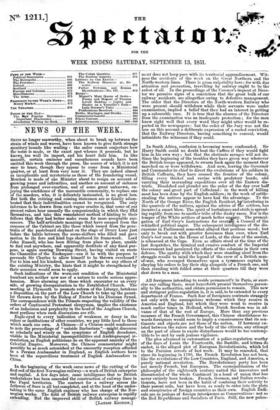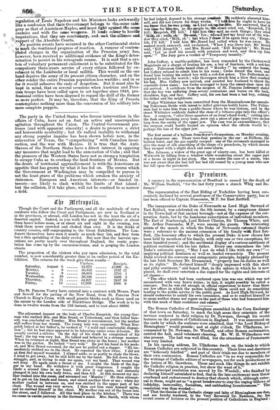All foreigners intending to reside permanently in Paris, or exer-
cise any calling there, must henceforth present themselves person- ally to the authorities, and obtain permission to remain. This new and stringent police-regulation is, it is said, to be extended to every department of France. Such fear of foreigners contrasts strangely not only with the unsuspicious welcome which they receive in America and England, but which they were wont to receive in much earlier times in Holland, when Dutch freedom was in ad- vance of that of the rest of Europe. More than any previous measure of the French Government, this Chinese churlishness to- wards foreigners would seem to imply a consciousness that its sen- timents and objects are not those of the nation. If harmony ex- isted between the rulers and the body of the citizens, any attempt on the part of aliens to excite disturbances would be too contemp- tible to be met by such jealous vigilance.
The plea advanced in extenuation of a police-regulation worthy of the days of Louis the Fourteenth, the Bastille, and lettres de cachet is the alleged plot of European Revolutionists, which led to the Parisian arrests of last week. It may be conceded, that since its beginning in 1789, the French Revolution has not been, like the revolutions of the Low Countries, England, and America, a purely national revolution. The Revolutionary party has been not merely French, but European. The cosmopolitanism of the philosophy of the eighteenth century united the innovators and discontented of the whole Continent in a bond of union that has never entirely been broken. French, German, and Italian revolu- tionists, have not been in the habit of confining their activity' to ' their parent soils, but have been as ready to enter into the plots and conspiracies of foreign countries as their own. English Radi- cals are as jealous of foreign interference as Conservatives: not so - the Red Republicans and Socialists of Paris. Still, the new police-
regulation of Louis Napoleon and his Ministers looks awkwardly like a confession that their:Government belongs to theesame eat& gory as that of .AuetrisoraTapleM,andMust fight against Abe same enemies and with the same weappnm. It lends colour to hostile imputations, that thby are-reactionary,. and seek theaillience an& snrn,ort of the Absolute Courts. o positive events have occurred in the other Continental states to mark thetontinued progress of reaction. A rumour of contem- plated changes in the organization of the Prussian army has, however, been received as additional evidence of the King's deter: mination to persist in his retrograde course. It is said that a sys- tem of voluntary permanent enlistment is to be substituted for the compulsory three-years service of every citizen followed by en- robnent in the Landwehr or local militia. This would on the one hancIdeprive the army of its present citizen character, and on the other render the entire Prussian population less warlike ; and in so far it would subserve the ends of despotism. But it must also be kept in mind, that on several occasions when Austrian and Prus- sian troops have been called upon to act together since 1848, pro- fessional critics have been disposed to regard the drill of the former as more perfect. It may be, therefore, that the King of Prussia contemplates nothing more than the conversion of his soldiery into more complete puppets.



























